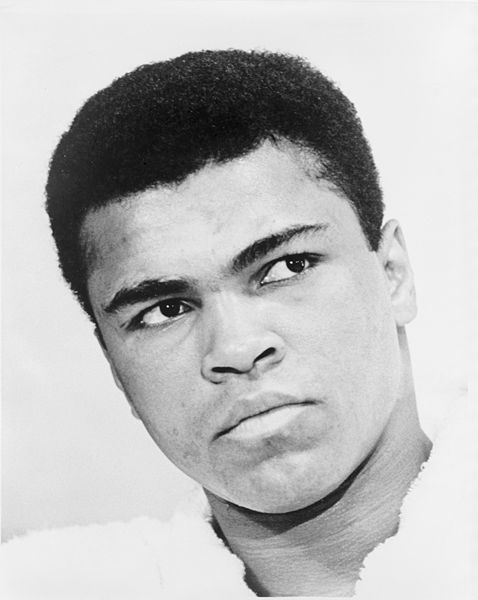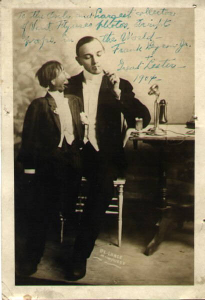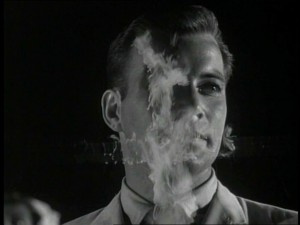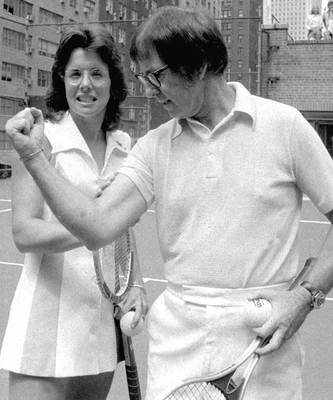From the May 5, 1860 Wisconsin Daily Patriot:
Ever-cheerful playwright Tennessee Williams talks to Bill Boggs. Full Q&A here.
Tags: Bill Boggs, Tennessee Williams
From a 1969 Life piece about the interlocutor Oriana Fallaci, who recalls introducing a young Muhammad Ali to her aggressive interviewing style:
“Question:
Has anyone actually threatened to break your nose off for something you wrote?
Oriana Fallaci:
Something like it happened with Cassius Clay. I had seen him a couple of times, and I went back to his house in Miami to finish the interview. He was eating a melon. I said, Good Morning, Mr. Clay. He keeps on eating the melon and suddenly belches very loud. I think he is just being impolite and I sit down with my tape recorder. And then oooaaagh. He belches again. A big one. Well, I said, let’s go on anyway. And just at that moment, buurp, buurp, whoops, whoops. I turned to him and shouted, I am not going to stay with an animal like you. And I was undoing my recorder, when he took the microphone and threw it against the wall. My microphone! I saw it flying past my head and I took my fists and bam, bam. Went against him. He stood there. So enormous. So tall. And he watched me in a way an elephant watches a mosquito. Black Muslims suddenly came out of all the doors into the room. Evil. Evil. They began to chant. You came for evil. It was like a nightmare. I backed out to my cab, trying to keep my dignity, but really afraid, and went straight to the airport. After the interview was published, Cassius Clay said he was going to break my nose if he ever saw me again. I said, we’ll see, if he breaks my nose, he is going to jail and we will have beautiful news in the papers. I saw him later in New York. I passed with my nose in the air, and he went by without looking at me.”
Tags: Cassius Clay, Muhammad Ali, Oriana Fallaci
There was perhaps no bigger reprobate in 1880s New York than the ventriloquist, as the following reports published in the Brooklyn Daily Eagle demonstrate.
••••••••••
“A Gallant Ventriloquist” (July 20, 1886): “Charles Young, a ventriloquist, who earns a living by exhibiting his acquirement at the West End, Coney Island, was arraigned before Justice Newtown there yesterday afternoon, on complaint of John Dunn, a cottager on the Island, who accused him of assault. Dunn told the Justice that Young had been out walking with his wife and when they returned home Dunn told Young that he should not be so free with another man’s wife. The gallant ventriloquist thereupon assaulted the remonstrating husband, who had him arrested. Young denied the charge and said he had a thousand young ladies to go out with, without taking another man’s wife. He was placed in $200 bonds to answer.”
••••••••••
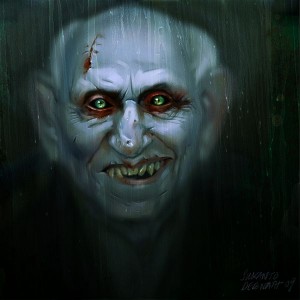
"A large crowd of people were attracted to the cemetery and they all concluded it was a ghost." (Image by Sukanto Debnath.)
“It Was Not a Ghost” (September 23, 1887): “Frederick Schmidt, of Middle Village, is an accomplished ventriloquist. On Tuesday night, about midnight, he secreted himself in the Lutheran Cemetery, on the outskirts of the village, and began to shriek ‘Murder! Murder! Oh, spare my life!’ at the top of a lofty falsetto voice. Justice Louis P. Knickmann and a large crowd of people were attracted to the cemetery and they all concluded it was a ghost. The justice chased the voice, but could not locate the specter and his hair stood on end along with the hair on the head of everybody present. Finally the voice seemed to hover over the crowd and then the justice and the crowd broke for Middle Village on a dead run. The justice cleared a fence six feet high surrounding the cemetery and was not aware of the fact until reminded of it two hours afterward by one who had observed the feat with astonishment. The justice is a large man. Mr. Schmidt has been smiling ever since.”
••••••••••
“Harry Kennedy Assaulted” (August 18, 1886): “Harry Kennedy, the ventriloquist and saloon keeper, met a few friends in a saloon at the Willink entrance to Prospect Park last night. He became involved in a dispute with a stranger and they clinched. Kennedy was thrown on his back, and the stranger kicked him about the face and body. His friends could not interfere, as they were under the influence of liquor. The strange man escaped from the room, and as no one knows him he will probably never be captured. Kennedy was taken in a carriage to his Coney Island saloon and is confined to his bed. His face is cut in several places and his body is covered in bruises.”
Video short about the Venus Project.
Another Jacque Fresco post:
Tags: Jaques Fresco

"Dalio appeared to compare Bridgewater to a pack of hyenas feeding on a young wildebeest."(Image by JerryFriedman.)
From John Cassidy’s New Yorker article about the odd inner workings of Bridgewater Associates, the world’s largest hedge fund, and its kingpin Ray Dalio:
“Dalio’s philosophy has created a workplace that some call creepy. Last year, Dealbreaker, a Wall Street Web site, picked up a copy of the Principles and made fun of a section in which Dalio appeared to compare Bridgewater to a pack of hyenas feeding on a young wildebeest. In March, AR, a magazine that covers hedge funds, quoted a former colleague of Dalio’s saying, ‘Bridgewater is a cult. It’s isolated, it has a charismatic leader and it has its own dogma.’ The authors of the article noted that Dalio’s ’emphasis on tearing down an individual’s ego hints at the so-called struggle groups of Maoism,’ while his search for “human perfection devoid of emotion resembles the fantasy world in Ayn Rand’s The Fountainhead.’
Dalio doesn’t pretend that Bridgewater is a typical workplace, but he is sensitive to criticism. The recent media attention irked him, because, in his view, it misrepresented and trivialized Bridgewater’s culture, which he insists is central to the firm’s success. ‘It is why we made money for our clients during the financial crisis when most others went over the cliff,’ he wrote to me in an e-mail. ‘Our greatest power is that we know that we don’t know and we are open to being wrong and learning.'”
Tags: John Cassidy, Ray Dalio
Kristen Stewart Autograph (With Certificate of Authenticity) (Inwood / Wash Hts)
BEST OFFER!
Kristen Stewart Autograph (With Certificate of Authenticity)
given to me by my ex, i hate the twilight movies so this is pretty much useless to me :p
not a fan of her either.
in an argument picture frame got broken so no frame.
Tags: Kristen Stewart
It was on the brink for a long time. (Thanks Dangerous Minds.)
It’s difficult to fathom what would have become of the career of schlockmeister Roger Corman if The Intruder, his incendiary 1962 melodrama about race baiting during the tense moments of the Civil Rights Movement, hadn’t been such an unreleasable flop. Rather than failing because of incompetence, the movie never made its mark because it was too searing a statement about too raw a subject, its dialogue too frank to easily take.
Adam Cramer (William Shatner) describes himself as a social worker, but he’s really an antisocial one. The Elmer Gantry of racial divisiveness, the white-suited Cramer storms into a small Southern town on the eve of court-ordered school integration and quickly puts his oratory skills to work. The locals spit more racial epithets than they do tobacco juice, but they’ve become resigned to the change in the air even if they don’t like it. But Cramer senses that there’s rabble to be roused, and his passionate pleas soon have the townsfolk in a lather.
Even the most liberal person in the community, the newspaper editor Tom McDaniel (Frank Maxwell), was against the forced integration, but after a black church is burned to the ground, he has a change of heart. But the interloper quickly has the scribe outnumbered and McDaniel and the black students reporting for class at white schools may be in grave danger.
Despite some writerly plot twists, Corman’s feel for the material and Shatner’s scary intensity make this picture one of the finer B-movies you’ll ever see. But it was a one-and-done reach for greatness by the director. When The Intruder proved too tough a sell, Corman resigned to be satisfied as an entertainer who buried anything meaningful very deep in the subtext. The material he worked with was never so rich again, and his sharp eye for composition on display here grew fuzzier as the screenplays grew worse. Of course, if he hadn’t turned to profitable dreck, Corman likely wouldn’t have been in a position to have midwifed filmmaking careers for Scorsese, Coppola and Bogdanovich, among others. But no matter what is and what might have been, The Intruder remains a testament to Corman’s early abilities.• (The Intruder just became available for streaming on Netflix.)
••••••••••
Recent Film Posts:
- Strange, Small & Forgotten Films: They Came Back (2004)
- Classic Film: The Rapture (1991)
- Recent Film: Somewhere
- Recent Film: Another Year
- Classic Film: The Truman Show (1996)
- Classic Film: Salesman (1968)
- Classic Film: Night of the Living Dead (1968)
- Classic Film: The Conversation (1974)
- Classic Film: King of Comedy (1982)
- Recent Film: Dogtooth
- Classic Film: RoboCop (1987)
- Recent Film: Marwencol (2010)
- Classic Film: Being There (1979)
- Classic Film: Woman in the Dunes (1964)
- Classic Film: The Man in the White Suit (1951)
Tags: Frank Maxwell, Roger Corman, William Shatner
Bobby Riggs, that huckster, profiled by Mike Wallace in 1973 for 60 Minutes prior to facing Billie Jean King in the Battle of the Sexes.
King and Riggs shill together for Sunbeam’s Mist-Stick Curler Dryer:
Tags: Bille Jean King, Bobby Riggs, Mike Wallace
Above is a classic 1922 photograph of a dead letter office, a way-station where misaddressed missives went to get back on the right track. An excerpt from an 1878 New York Times article in which the staff of a Manhattan dead letter office was profiled:
“The deparment is in charge of Mr. John H. Hallett, a white-haired, white-bearded, bright-eyed old gentleman, 65 and upward, but still as lively and business-like as a man of 30. He has seen just half a century of service in the Post Office, and he is a perfect encylopedia of New-York history. What he does not know about misdirected, badly written, mutilated, and unmailable letters, it would be useless for anybody to try to find out. Assisting Mr. Hallett in straightening the address of badly directed letters are two experienced clerks, whose intuition into things is little less than marvelous. They handled last month 11,800 imperfectly or wrongly directed letters, and sent to their destination all except 217. They have handled an average of 500 letters a day for the last two months, and the blunderers are increasing at a steady rate.”
Tags: John H. Hallett
The opening of Tom Junod’s excellent 1994 GQ article, “The Abortionist,” a profile of Dr. John Bayard Britton, who was murdered several months after this piece was published:
“The abortionist makes house calls. The abortionist’s patient, Mr. Beazley, is dying, and the abortionist has made a habit of visiting his house after work, to steer him to his end. Mr. Beazley is an old man, dying in his bed. He is beyond speech, beyond seeing and hearing. His lips are blue, and his gray tongue hangs out of his mouth. His wife and daughters stroke his arm, his leg. A drip bag, suspended over his bed, feeds him. The abortionist adjusts the rate of the drip. There is nothing else he can do. He cannot save Mr. Beazley. He cannot do anything but deaden his pain and console his family, and for this the Beazleys love him. ‘Oh, Doc, I can’t tell you how much we brag on you,’ Mrs. Beazley says to him in her weary smoker’s voice, and every few minutes a little blonde girl in an orange skirt -Mr. Beazley’s granddaughter-hands him, with a curtsy, a fresh drawing of the sun. The abortionist puts the drawings in his pocket and bows. The abortionist has a weakness for children. Some years ago, he delivered babies. The abortionist is a family doctor, and he understands that what he is doing -drawing out Mr. Beazley’s death- is simply a gesture for the family’s sake: an exercise that enables the Beazleys to believe they have done all they can, and to get a head start on their grief. The abortionist would rather let Mr. Beazley go. He is not, as he says, ‘sentimental,’ and he is ready to withhold the medicines that allow Mr. Beazley his scant purchase on existence. As a physician, he has decided that Mr. Beazley is already gone, and it is this-his willingness to make decisions, to answer questions of life and death-that permits Dr. John Bayard Britton to believe that one day, should his enemies come to kill him, he will find the courage to kill them first.”
Another Tom Junod post:
Tags: John Bayard Britton

"It was a tightly contested match against a local dentist, whose practice was suspended temporarily because of 'abject filthy conditions'"
WHY DID MY PARTNER TURN AGAINST ME? (OSCAR’S PATIO CAFE)
I often play golf with a younger, left handed, single digit player for whom I have great admiration. Yesterday, I was playing my heart out for my partner who was struggling a little bit in the early going. It was a tightly contested match against a local dentist, whose practice was suspended temporarily because of ” abject filthy conditions” and a psychotically competetitive masseuseur who pretends to be a “physical therapist”. On the eighth hole, a par three, i hit my tee shot into the hedges. Chopped out into the sand. then bladed a wedge to the other side of the green where the ball rested against the collar. My partner was lying one just off the green. Even though he knew I was disgusted and a little out of breath (suffering from a chest cold), he expected me to run across the green and putt so he could see the line. I was incredulous since his putt was not that difficult. I walked to my ball but before I could hit, he flubbled a chip or putt leaving it woefully short. Long story short, he three putt. the other team got up and down for par and we lost the hole. My partner was furious with me because I “rushed” him. Later in the match, he tried to get me to hit the wrong ball (we have a judge/member who has perfected this trick) and also bullied me on a tee box on 15 and made me bury my drive in fairway bunker. I think he was showing off for the young caddy who was stroking him for 18 holes. I don’t think he craves cock, but he has a friend (initials: OJ) who does. what should I do?
Old-school NASA.
More Space Exploration posts:
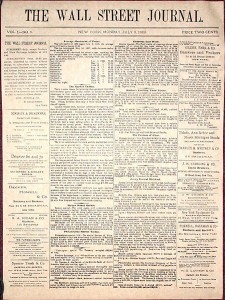 The Wall Street Journal, a newspaper with some amazing reporters, today runs a “defense” of its parent company that would make Fox & Friends hosts cringe. The one News Corp. paper that you’d hope would come out of this ever-growing scandal unscathed is now stained by it. The tone-deaf opening:
The Wall Street Journal, a newspaper with some amazing reporters, today runs a “defense” of its parent company that would make Fox & Friends hosts cringe. The one News Corp. paper that you’d hope would come out of this ever-growing scandal unscathed is now stained by it. The tone-deaf opening:
“When News Corp. and CEO Rupert Murdoch secured enough shares to buy Dow Jones & Co. four years ago, these columns welcomed our new owner and promised to stand by the same standards and principles we always had. That promise is worth repeating now that politicians and our competitors are using the phone-hacking years ago at a British corner of News Corp. to assail the Journal, and perhaps injure press freedom in general.
***
At least three British investigations into phone-hacking and payments to police and others by the now-shuttered News of the World tabloid are underway, with 10 arrests so far. News Corp. and its executives have apologized profusely and are cooperating with authorities. Phone-hacking is illegal, and it is up to British authorities to enforce their laws. If Scotland Yard failed to do so adequately when the hacking was first uncovered several years ago, then that is more troubling than the hacking itself.”
Also:
In a 1993 Wired interview conducted by Gary Wolf, Steve Jobs, who was then doing his walkabout at NeXT, spoke cautiously about the World Wide Web. He thought it would be great for commerce but maybe not landscape-altering in essential ways. He was right in that all the connectivity and information hasn’t stopped wars or thinned the ranks of ignorant politicians.
One interesting thing that Jobs said was that the Web wouldn’t have the same awesome immediate impact that radio and TV had, that it would creep up on people. I think that’s true. Because the Web is controlled to a good extent by users, its wow factor is revealed incrementally, as people continue to tinker with it and grow it out. Ultimately, it will have much greater consequence for change than earlier technologies that made a bigger initial splash but were hampered by central control. An excerpt from the Q&A:
“What’s the biggest surprise this technology will deliver?
Steve Jobs: The problem is I’m older now, I’m 40 years old, and this stuff doesn’t change the world. It really doesn’t.
That’s going to break people’s hearts.
Steve Jobs: I’m sorry, it’s true. Having children really changes your view on these things. We’re born, we live for a brief instant, and we die. It’s been happening for a long time. Technology is not changing it much – if at all.
These technologies can make life easier, can let us touch people we might not otherwise. You may have a child with a birth defect and be able to get in touch with other parents and support groups, get medical information, the latest experimental drugs. These things can profoundly influence life. I’m not downplaying that. But it’s a disservice to constantly put things in this radical new light – that it’s going to change everything. Things don’t have to change the world to be important.
The Web is going to be very important. Is it going to be a life-changing event for millions of people? No. I mean, maybe. But it’s not an assured Yes at this point. And it’ll probably creep up on people.
It’s certainly not going to be like the first time somebody saw a television. It’s certainly not going to be as profound as when someone in Nebraska first heard a radio broadcast. It’s not going to be that profound.
Then how will the Web impact our society?
Steve Jobs: We live in an information economy, but I don’t believe we live in an information society. People are thinking less than they used to. It’s primarily because of television. People are reading less and they’re certainly thinking less. So, I don’t see most people using the Web to get more information. We’re already in information overload. No matter how much information the Web can dish out, most people get far more information than they can assimilate anyway.”
••••••••••
The William Morris Agency gets NeXT computers in 1990:
From Japan, of course.
 Italian novelist Paolo Giordano went to Disneyland all by his lonesome and filed a report for the Wall Street Journal. An excerpt:
Italian novelist Paolo Giordano went to Disneyland all by his lonesome and filed a report for the Wall Street Journal. An excerpt:
“I take no rides in Disneyland, not even one, but I go into the reassuring auditorium where they show the return of ‘Captain EO’ in amazing 3-D and the temperature change is severe. Mothers extract sweaters from their bags, but the children have no intention of wearing them. They are thinking how funny they look with those big 3-D glasses on their faces, even though 3-D is no innovation for them; it’s nothing special, like this place Disneyland is nothing special. It looks a little old and there’s much more future in the Nintendo DSs, iPods, PlayStation Portables they’re carrying in their pockets.
Only small children still marvel—the Asian girl sitting at my left side, for example, she’s terrified by the dark and the wild assault of people trying to get the best seats and by Captain EO himself who—I’m discovering now—is Michael Jackson, close to his original color and surrounded by a group of tiny farting monsters. He has a mission to accomplish that later results in him dancing amid androids and repeating ‘We are here to change the world,’ which more or less is what he’d said throughout his career. When the seats start bouncing to the beat of the bass drum, I think that one of the ways Michael Jackson changed the world was to build a place similar to this one, a colorful trap for children where he decided to live, and the reason why he did it appears to me at once to be clear, tender, dreadful and incomprehensible.”
••••••••••
A little Captain EO:
Other Disney-related posts:
Tags: Paolo Giordano
I don’t know why, but I would rather read newspapers and magazines online but still prefer to read old-fashioned, non-virtual books. Maybe it has to do with the length of time we spend with an article as opposed to a longer work. I think it’s something I’ll get over soon, though I probably won’t have a choice. But I’m all in favor of digitization of printed materials of value (and even of dubious value) and the democratization of scholarship that it allows. James Gleick speaks to this issue a new Op-Ed piece in the New York Times. An excerpt:
“Where some see enrichment, others see impoverishment. Tristram Hunt, an English historian and member of Parliament, complained in The Observer this month that ‘techno-enthusiasm’ threatens to cheapen scholarship. ‘When everything is downloadable, the mystery of history can be lost,’ he wrote. ‘It is only with MS in hand that the real meaning of the text becomes apparent: its rhythms and cadences, the relationship of image to word, the passion of the argument or cold logic of the case.’
I’m not buying this. I think it’s sentimentalism, and even fetishization. It’s related to the fancy that what one loves about books is the grain of paper and the scent of glue.
Some of the qualms about digital research reflect a feeling that anything obtained too easily loses its value. What we work for, we better appreciate. If an amateur can be beamed to the top of Mount Everest, will the view be as magnificent as for someone who has accomplished the climb? Maybe not, because magnificence is subjective. But it’s the same view.”
Another James Gleick post:
Tags: James Gleick
In the future, you will be able to live forever. Though videos about immortality will still, apparently, have shitty production values.
The odd behavior of the massage therapist.
I was in a car accident a few months ago. As part of the post-operative rehabilitation, my doctor refereed me to a chiropractor. Part of the treatment I am receiving is massage therapy. The therapists are professional, pleasant and friendly.We would speak briefly about innocuous things.
There is one girl that likes to ask indirect, information seeking questions. One day my phone fell put of my pocket onto the table,I was almost out to the parking lot when I discovered it missing. When i went back into the room to look for it, there she was scrolling through my phone! She said that she has one like it and she was checking to see if mine had the same features. I chuckled and said “I did not think that anyone under forty still had one of these old razor phones.” and I left it at that. I thought to myself “damn what a nosy little bitch.”
On Tuesday one of the office staff photocopied something for me and put it in an envelope. I did not want it to get crushed in my pocket, so when I went in the room, I put it on top of the closet. After the session with the same girl, I forgot the envelope and returned for it a few minutes later. She was standing there holding the sheet I had been lying on up to her face with her eyes closed. Her eyes flew open and her face turned red when she saw me. I pretended not to notice anything unusual and said “I forgot the envelope” and retrieved it from the top of the closet.
I am not so conceited as to think that such an attractive young girl would be enamored of an overweight 44 year old guy with daughters her age. I am both amused and curious as I wonder, what is wrong with her ?
A vital report of national importance, the following account of a very puny dog ran in the December 6, 1885 Brooklyn Daily Eagle. An excerpt:
“Tiny, a black and tan terrier, has the honor of having been the smallest full grown dog that ever lived. He belonged to Lieutenant General Sir Archibald Maclaine of England, and in honor of his extreme tininess, is now carefully preserved under a glass case. Tiny was less than four inches long, and could comfortably curl up and take a nap in a common glass tumbler. An ordinary finger ring was large enough for his collar, and when he sat up, a baby’s hand would almost have made a broad and safe resting place for him. Of course, Tiny was no account against a rat. Indeed, a hearty, self-respecting mouse would have stood its ground against the little fellow. But if Tiny had not strength, he did have courage, and would bark as lustily as his little lungs would let him at the biggest rat that ever lived–when the rat was dead.
To tell the whole truth, Tiny was remarkable and he was famous, but he was not very happy. He could have almost anything he wished to eat, but he had no appetite. He shivered most of the time, even though he was usually hidden in warm wraps. Of course, he caught cold easily, and then, oh, dear, how pitifully he did sneeze.”
Tags: Tiny
Some of the search-engine keyphrases bringing traffic to Afflictor this week:
- Strange, Small & Forgotten Film: They Came Back (2004).
- Old Print Articles: Corpse is too big for coffin (1884) + Whale kills sea captain (1896) + Monkey gets drunk in Louisville (1901).
- Classic Photographs: Mayor Gaynor, wounded by gunman (1910).
- Featured Videos: Alan Resnais’ short film about plastic (1958) + Teshigahara captures Tokyo (1958) + Frank Lloyd Wright designed a gas station + Amazing robot soccer + David’s appliance function without him + Vincent Fournier’s incredible space-themed photos + Germany’s futuristic shooting range + Tom Snyder discusses the coming tech revolution (1979) + Ericsson looks into the future (1985) + Motion picture sound is born in NYC + Photographer Garry Winogrand interviewed (1981).
- Recently Posted on NYC’s Craigslist: Horny nonagenarian thinks his oversharing neighbor is a “dish” + I’d like to own a kilt but don’t want to pay exorbitant kilt prices + I’d like a vampire tattoo but don’t want to pay exorbitant vampire tattoo prices + KFC eliminated its five dollar meal + Looking to buy a ukulele that’s not pink.
- Barry Bremen was a professional impostor.
- Evgeny Morozov’s concise history of the Internet.
- Barbara Ehrenreich discusses cyborg insects.
- The Lavasa Corporation is building you a new home in India.
- The police are ready to scan your iris now.
- Freeman Dyson reviews two new books about Richard Feynman.
- Looking back at the 1970s Yankees family-swapping scandal.
- Wall Street Journal shareholders just realized that News Corp. is sleazy.
- Ben Katchor carries on the work of Joseph Mitchell and A.J. Liebling.
- Lauren Collins’ 2007 Banksy article is online for free.
- Classic story by George Saunders is online for free.
- Front lawns are completely useless.
- We’ve begun using the Internet as our default memory.
- Bill James suggests newer and better prisons.
- Bill James thinks someday we will all be on steroids.
- Margaret Talbot explains the concept of “mission creep.”
- The praying never stops at the International House of Prayer.
- Some cars used to have record players.
- The Chinese village of Huaxi is very wealthy and sort of socialist.
- Jose Feliciano’s rendition of the National Anthem was scandalous in 1966.
- Mike Davis profiles eminent Angeleno Harrison Gray Otis.
- A 1996 Tom Wolfe essay explains how neuroscience became ascendant.
- Supposedly dead media (telegraph, telex, etc.) that continue to live on.
- Happy birthday, Nikola Tesla!
- This week’s Afflictor keyphrase searches.


